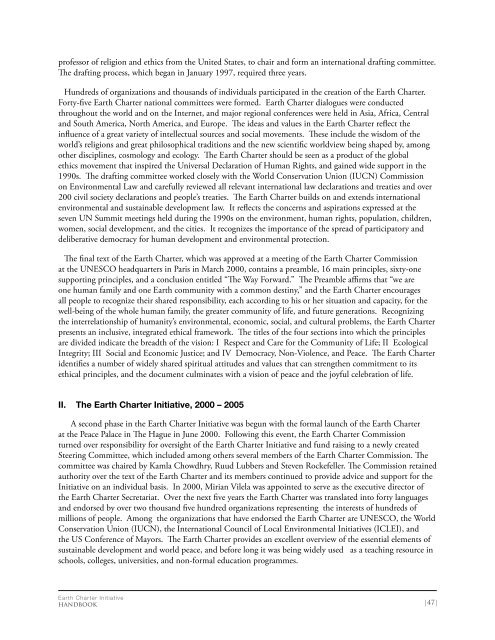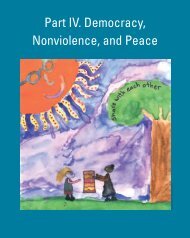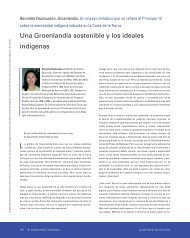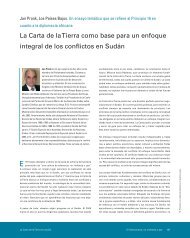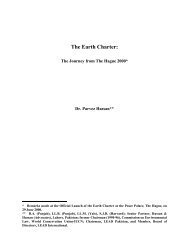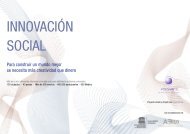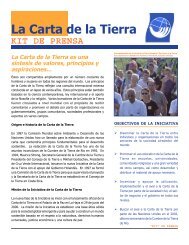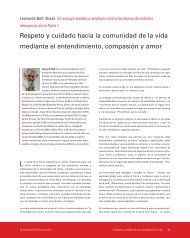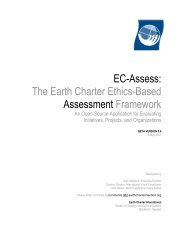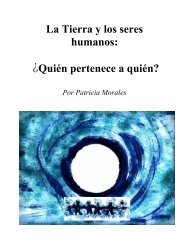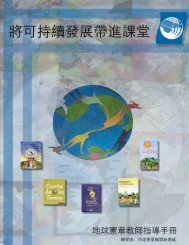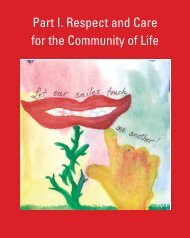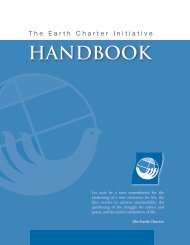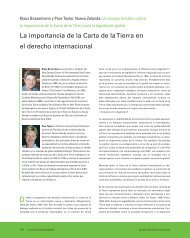Handbook English - Earth Charter Initiative
Handbook English - Earth Charter Initiative
Handbook English - Earth Charter Initiative
You also want an ePaper? Increase the reach of your titles
YUMPU automatically turns print PDFs into web optimized ePapers that Google loves.
professor of religion and ethics from the United States, to chair and form an international drafting committee.<br />
The drafting process, which began in January 1997, required three years.<br />
Hundreds of organizations and thousands of individuals participated in the creation of the <strong>Earth</strong> <strong>Charter</strong>.<br />
Forty-five <strong>Earth</strong> <strong>Charter</strong> national committees were formed. <strong>Earth</strong> <strong>Charter</strong> dialogues were conducted<br />
throughout the world and on the Internet, and major regional conferences were held in Asia, Africa, Central<br />
and South America, North America, and Europe. The ideas and values in the <strong>Earth</strong> <strong>Charter</strong> reflect the<br />
influence of a great variety of intellectual sources and social movements. These include the wisdom of the<br />
world’s religions and great philosophical traditions and the new scientific worldview being shaped by, among<br />
other disciplines, cosmology and ecology. The <strong>Earth</strong> <strong>Charter</strong> should be seen as a product of the global<br />
ethics movement that inspired the Universal Declaration of Human Rights, and gained wide support in the<br />
1990s. The drafting committee worked closely with the World Conservation Union (IUCN) Commission<br />
on Environmental Law and carefully reviewed all relevant international law declarations and treaties and over<br />
200 civil society declarations and people’s treaties. The <strong>Earth</strong> <strong>Charter</strong> builds on and extends international<br />
environmental and sustainable development law. It reflects the concerns and aspirations expressed at the<br />
seven UN Summit meetings held during the 1990s on the environment, human rights, population, children,<br />
women, social development, and the cities. It recognizes the importance of the spread of participatory and<br />
deliberative democracy for human development and environmental protection.<br />
The final text of the <strong>Earth</strong> <strong>Charter</strong>, which was approved at a meeting of the <strong>Earth</strong> <strong>Charter</strong> Commission<br />
at the UNESCO headquarters in Paris in March 2000, contains a preamble, 16 main principles, sixty-one<br />
supporting principles, and a conclusion entitled “The Way Forward.” The Preamble affirms that “we are<br />
one human family and one <strong>Earth</strong> community with a common destiny,” and the <strong>Earth</strong> <strong>Charter</strong> encourages<br />
all people to recognize their shared responsibility, each according to his or her situation and capacity, for the<br />
well-being of the whole human family, the greater community of life, and future generations. Recognizing<br />
the interrelationship of humanity’s environmental, economic, social, and cultural problems, the <strong>Earth</strong> <strong>Charter</strong><br />
presents an inclusive, integrated ethical framework. The titles of the four sections into which the principles<br />
are divided indicate the breadth of the vision: I Respect and Care for the Community of Life; II Ecological<br />
Integrity; III Social and Economic Justice; and IV Democracy, Non-Violence, and Peace. The <strong>Earth</strong> <strong>Charter</strong><br />
identifies a number of widely shared spiritual attitudes and values that can strengthen commitment to its<br />
ethical principles, and the document culminates with a vision of peace and the joyful celebration of life.<br />
II. The <strong>Earth</strong> <strong>Charter</strong> <strong>Initiative</strong>, 2000 – 2005<br />
A second phase in the <strong>Earth</strong> <strong>Charter</strong> <strong>Initiative</strong> was begun with the formal launch of the <strong>Earth</strong> <strong>Charter</strong><br />
at the Peace Palace in The Hague in June 2000. Following this event, the <strong>Earth</strong> <strong>Charter</strong> Commission<br />
turned over responsibility for oversight of the <strong>Earth</strong> <strong>Charter</strong> <strong>Initiative</strong> and fund raising to a newly created<br />
Steering Committee, which included among others several members of the <strong>Earth</strong> <strong>Charter</strong> Commission. The<br />
committee was chaired by Kamla Chowdhry, Ruud Lubbers and Steven Rockefeller. The Commission retained<br />
authority over the text of the <strong>Earth</strong> <strong>Charter</strong> and its members continued to provide advice and support for the<br />
<strong>Initiative</strong> on an individual basis. In 2000, Mirian Vilela was appointed to serve as the executive director of<br />
the <strong>Earth</strong> <strong>Charter</strong> Secretariat. Over the next five years the <strong>Earth</strong> <strong>Charter</strong> was translated into forty languages<br />
and endorsed by over two thousand five hundred organizations representing the interests of hundreds of<br />
millions of people. Among the organizations that have endorsed the <strong>Earth</strong> <strong>Charter</strong> are UNESCO, the World<br />
Conservation Union (IUCN), the International Council of Local Environmental <strong>Initiative</strong>s (ICLEI), and<br />
the US Conference of Mayors. The <strong>Earth</strong> <strong>Charter</strong> provides an excellent overview of the essential elements of<br />
sustainable development and world peace, and before long it was being widely used as a teaching resource in<br />
schools, colleges, universities, and non-formal education programmes.<br />
<strong>Earth</strong> <strong>Charter</strong> <strong>Initiative</strong><br />
HANDBOOK |47|


